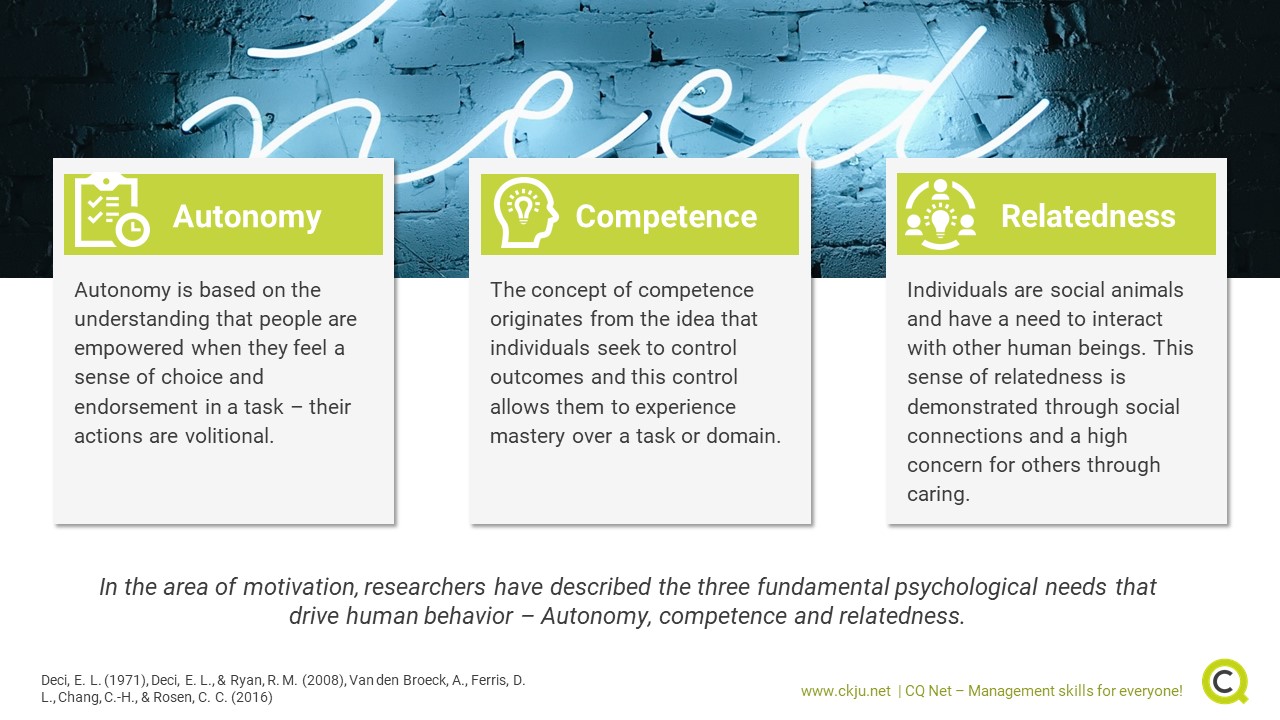- All Management Learning Resources
- Basic psychological needs

Executive summary
In this CQ Dossier we focus on the importance of basic psychological needs and their relevance in the workplace. We have a look at the three fundamental needs – autonomy, competence, and relatedness – and discuss their important to workplace thriving and achievement within the workplace. First, we provide a definition of the three basic needs and the theoretical framework – self-determination theory. Second, we describe how to measure the basic psychological needs. Third, we describe research linking the three psychological needs to organizational effectiveness. Finally, we provide recommendations on how to effectively harness the three needs as part of your management skill development efforts.
Contents
- Executive summary
- What are the three basic psychological needs autonomy, competence and relatedness?
- Basic psychological needs are a buidling block of self-determination theory (SDT)
- How to measure the three basic psychological needs
- Basic psychological needs and positive work outcomes
- Basic psychological needs are negatively related to role stressors, work-family conflict, job insecurity
- Basic psychological needs are related to intrinsic motivation
- Evidence supports the importance of the three needs in predicting workplace outcomes
- How to harness the basic psychological needs
- Critical appraisal of basic psychological needs: Solidity Level 4
- Key take-aways
- References and further readings
What are the three basic psychological needs autonomy, competence and relatedness?
In the area of motivation, researchers have described the three fundamental psychological needs that drive human behavior – Autonomy, competence and relatedness. These three needs are core dimensions of self-determination theory. This theory was developed by Deci and Ryan (2008) and posits that individuals have a fundamental need to have control of the work that they do and this leads to a sense of satisfaction.
Basic psychological needs are a buidling block of self-determination theory (SDT)
The concept of self-determination understands that people are naturally curious and seek to have choice in the activities that they pursue. This is the essence of intrinsic motivation whereby people are motivated to perform based on the inherent enjoyment of the task rather than through extrinsic motivators such as pay or other rewards. There is variation in this degree of intrinsic motivation with individuals varying in terms of the autonomy, competency, and relatedness, they experience due to individual differences and situations that either encourage or diminish the opportunity to show self-determination.
Management skills newsletter
Join our monthly newsletter to receive management tips, tricks and insights directly into your inbox!
Autonomy: A sense of choice and endorsement in a task
Autonomy is based on the understanding that people are empowered when they feel a sense of choice and endorsement in a task – their actions are volitional (Deci & Ryan, 2008). Deci and Ryan distinguish between autonomy and independence whereby individuals act volitionally with a sense of choice, whereas those who are independent prefer to work alone. Autonomous individuals can choose to work alone or can rely on others yet still gain a sense of intrinsic motivation from engaging in tasks.
Competence: The experience of mastery over a task or particular domain
The concept of competence originates from the idea that individuals seek to control outcomes and this control allows them to experience mastery over a task or particular domain. In one of Deci’s studies, he examined the importance of competence and feedback (Deci, 1971). When individuals were given positive feedback that was unexpected, this increased their intrinsic motivation to complete the task.
Relatedness: Social connections and a high concern for others
Individuals are social animals and have a need to interact with other human beings. This sense of relatedness is demonstrated through social connections and a high concern for others through caring. Self-determination theory posits that relatedness is important for individuals and is linked to intrinsic motivation. In a study by Grolnick and Ryan, they found that children who found their teachers to be cold and uncaring were less intrinsically motivated because the teachers did not fulfill their needs of relatedness (Grolnick & Ryan, 1989).
Self-determination theory states that the three needs of autonomy, competence, and relatedness must be met and if one of these needs is not met then individuals will experience poor psychological health (Deci & Ryan, 2008).
How to measure the three basic psychological needs
There has been considerable research on the topic of basic psychological needs, yet there is less attention on how to measure needs satisfaction. Most of the research has been conducted in various settings. The Self-determination website provides a variety of measures for use including measures to assess Basic Psychological needs. Fortunately, one of these settings is the workplace with an initial first step to generalize Self-determination Theory within organizations in other cultures (Deci et al., 2001). However, the authors point out that this scale still needs validation, but the preliminary results are positive.
To develop the scale, Deci et al. (2001) collected data from companies in Bulgaria and found evidence for a three factor-model to support self-determination theory. The 21-item questionnaire included items such as
- “I feel like I can make a lot of inputs to deciding how my job gets done” (autonomy),
- “I enjoy the challenge my work provides” (competence), and
- “I really like the people I work with (relatedness).
They also used a small sample of American corporations for comparative purposes and found the model fit the data for both countries (Deci et al., 2001).
Basic psychological needs and positive work outcomes
There is evidence that the three basic psychological needs are positively related to work outcomes. A recent meta-analytic review of self-determination theory tested the unique contribution of each of the needs to psychological growth, internalization, and psychological well-being (Van den Broeck et al., 2016). In addition, they also tested the appropriateness of an overall need satisfaction measure and its relationship to the workplace outcomes. The meta-analysis included 99 studies with 199 distinct samples.
Basic psychological needs are negatively related to role stressors, work-family conflict, job insecurity
They found that the three needs were negatively related to role stressors, work-family conflict and job insecurity (Van den Broeck et al., 2016). However, some of the findings were mixed. Autonomy and competence were negatively related to workload and emotional demands; however, autonomy was unrelated to cognitive demands while competence was positively related to this outcome. Relatedness was positively related to cognitive demands and unrelated to workload and emotional demands.
Basic psychological needs are related to intrinsic motivation
When testing the main effects of the three needs on growth, internalization, and well-being, the findings were positive with support for the hypothesis. Each need explained unique variance in intrinsic motivation, explain 42% of the total variance; moreover, each need accounted for unique variation in the three outcomes.
Evidence supports the importance of the three needs in predicting workplace outcomes
The three basic psychological needs also accounted for unique variance in workplace outcomes, such as effort, deviance behavior, absenteeism and task performance (creative and proactive performance). Overall, this meta-analysis provides support for the importance of the three needs in predicting workplace outcomes.
How to harness the basic psychological needs
The research on basic psychological needs supports the idea that it is advantageous for organizations to support the three needs – autonomy, competence, and relatedness – because each of the needs is unique and important in determining well-being in the workplace.
Autonomy: Do not micro-manage or enforce bureaucratic rules
In terms of autonomy, organizations can ensure that employees have control over their work and make decisions regarding their roles. It is important that employers do not micro-manage or enforce bureaucratic rules that dampen autonomy. Managerial support is also an importance predictor of all three of the psychological needs so managers can encourage their subordinates to be autonomous (Williams et al., 2014).
Competence: Provide positive feedback to employees
When individuals have a need for competence, positive feedback is one way in which managers and organizations can change and meet this need. Deci found that giving positive feedback on the task only increased intrinsic motivation and decreased external motivation. People finished the task because they enjoyed it and it led to a sense of competence. In a study by Vallerand and Reid (1984) negative feedback decreased intrinsic motivation and stymied individual need for competence.
Relatedness: Form teams and create a sense of belonging
Relatedness needs can be met through forming teams that allow team members to grow through working on innovative projects.
In conclusion, it is important for organizations to enhance basic psychological needs through providing interventions that allow employees to grow in autonomy, competence, and relatedness. The research provides support for the three-factor model and demonstrates that self-determination theory is a valid model for motivation.
Critical appraisal of basic psychological needs: Solidity Level 4
Based on the empirical evidence for the importance of basic psychological needs, this CQ Dossier is assigned a Level 4 rating, (Based on a 1- 5 measurement scale). A level 4 is the second highest rating score for a dossier based on the evidence provided on the efficacy of basic psychological needs. To date, the research on the basic psychological needs has demonstrated the importance of this construct in the workplace. Future research needs to further verify the measurement of the three basic psychological needs in the workplace because the measure is still in its infancy.
Key take-aways
- Autonomy, competence and relatedness are basic psychological needs
- Self-determination theory (SDT) posits that people are naturally curious and strive to do well
- SDT states that all three needs must be met, or individuals will experience poor psychological health
- Self-determination in the workplace can be measured by a 21-item questionnaire. The measure shows some support for validation.
- Research shows that basic psychological needs are related to work outcomes
- Managerial support is important in harnessing basic psychological needs
References and further readings
Deci, E. L. (1971). "Effects of externally mediated rewards on intrinsic motivation". Journal of Personality and Social Psychology. 18: 105–115.
Deci, E. L., Ryan, R. M., Gagné, M., Leone, D. R., Usunov, J., & Kornazheva, B. P. (2001). Need satisfaction, motivation, and well-being in the work organizations of a former eastern bloc country: A cross-cultural study of self-determination. Personality and Psychology Bulletin, 27, 930–942.
Deci, E. L., & Ryan, R. M. (2008). Facilitating Optimal Motivation and Psychological Well-Being Across Life's Domains. Canadian Psychology/Psychologie Canadienne 49, 14-23.
Grolnick, W. S. & Ryan, R. M. (1989). Parent styles associated with children's self-regulation and competence in schools. Journal of Educational Psychology, 81, 2, 143–154.
Vallerand, R. J. & Reid, G. (1984). "On the causal effects of perceived competence on intrinsic motivation: A test of cognitive evaluation theory". Journal of Sport Psychology. 6: 94–102.
Van den Broeck, A., Ferris, D. L., Chang, C.-H., & Rosen, C. C. (2016). A Review of Self-Determination Theory’s Basic Psychological Needs at Work. Journal of Management, 42(5), 1195–1229.
Williams, G. C., Halvari, H., Niemiec, C. P., Sørebø, Ø., Olafsen, A. H., & Westbye, C. (2014). Managerial support for basic psychological needs, somatic symptom burden and work-related correlates: A self-determination theory perspective. Work & Stress, 28, 4, 404-419.
About the Author






